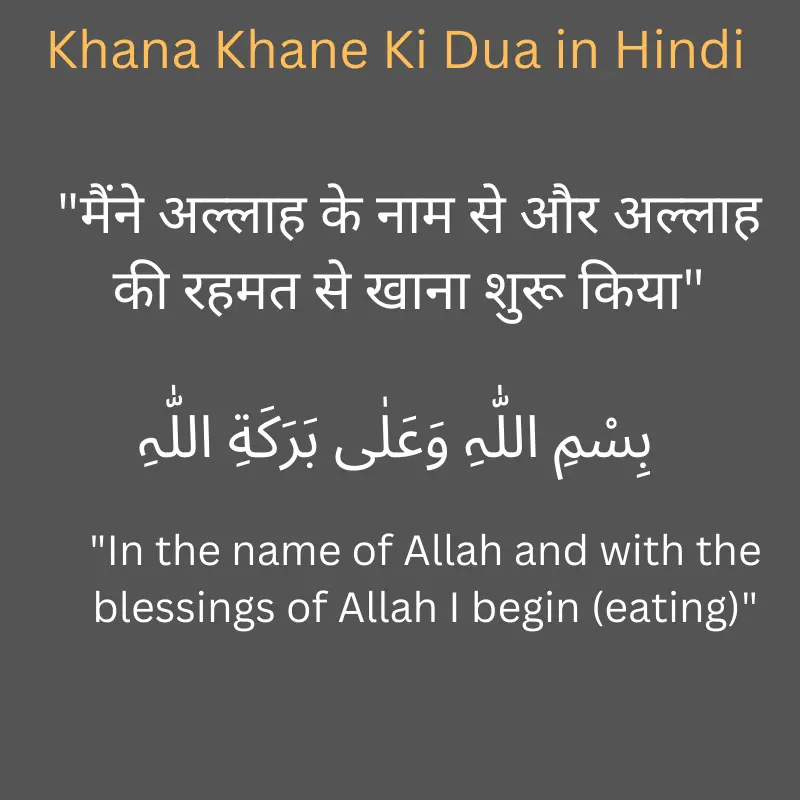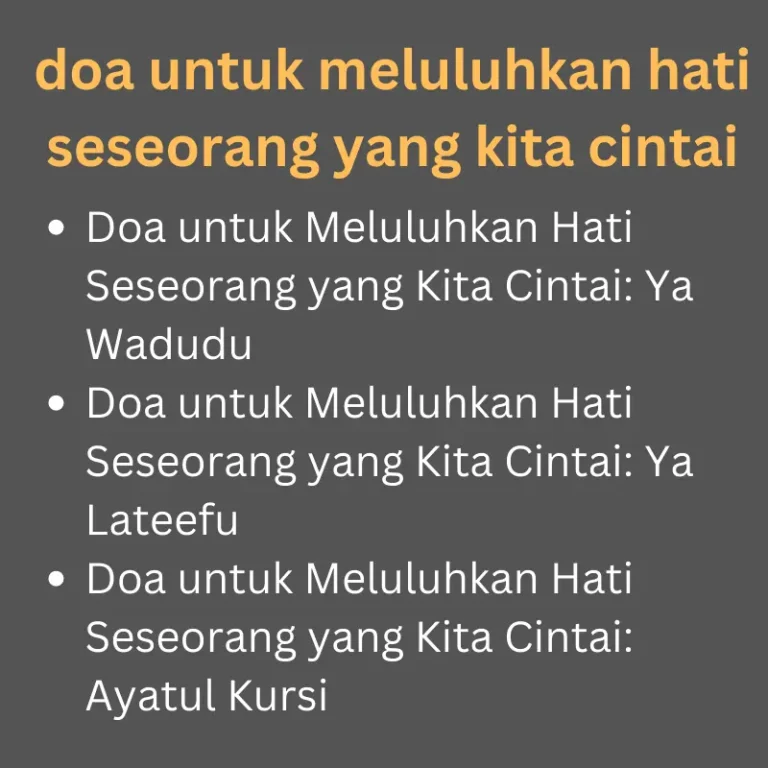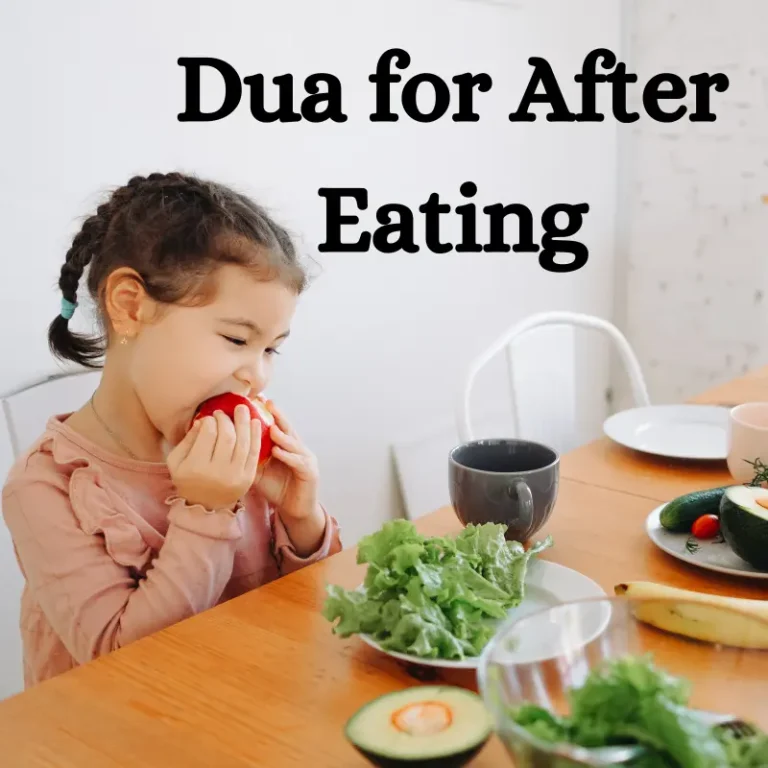When it comes to partaking in a meal, expressing gratitude and seeking blessings is a common practice in many cultures. In Hindi, there is a specific prayer called “Khana Khane Ki Dua” that is recited before eating. This article aims to explore the significance of Khana Khane Ki Dua in Hindi, its meaning, and the spiritual and cultural aspects associated with it.
Khana Khane Ki Dua in Hindi
भोजन से पहले दुआ

“मैंने अल्लाह के नाम से और अल्लाह की रहमत से खाना शुरू किया”
Khana Khane Ki Dua in English
“In the name of Allah and with the blessings of Allah I begin (eating)”
Islam and Khana Khane ki Dua
In the Islamic faith, expressing gratitude to Allah for providing sustenance is an important practice. Muslims believe that food is a gift from Allah and should be consumed with gratitude and humility. To express gratitude, Muslims recite a prayer before and after having their meals, known as the Khana Khane Ki Dua in Hindi.
Benefits of Reciting Khana Khane Ki Dua in Hindi
There are numerous benefits of reciting the Khana Khane Ki Dua in Hindi. Some of these benefits are:
Expressing gratitude: The Khana Khane Ki Dua in Hindi is a powerful way to express gratitude to Allah for providing sustenance. By reciting this prayer before and after having meals, Muslims show their gratitude and humility.
Seeking blessings: By reciting the Khana Khane Ki Dua in Hindi, Muslims seek blessings from Allah for their food. They ask for His blessings and mercy to be upon their meals and for the food to be nourishing and beneficial.
Spiritual benefits: Reciting the Khana Khane Ki Dua in Hindi has spiritual benefits as well. It reminds Muslims of their relationship with Allah and their duty to express gratitude for His blessings.
Understanding the Meaning and Importance
The term “Khana Khane Ki Dua” can be translated to “Prayer before Eating” in English. It emphasizes the significance of acknowledging and appreciating the blessings of food. By reciting this dua, individuals acknowledge the source of their sustenance and express gratitude for the nourishment they are about to receive.
In the Indian culture, expressing gratitude and seeking blessings before meals is a cherished tradition. “Khana Khane Ki Dua” is a phrase commonly used to refer to the prayer recited before consuming food. This article delves into the significance of Khana Khane Ki Dua, its meaning, and the benefits associated with its recitation.
The Significance of Dua before Meals
Prayers and invocations hold immense importance in various religious and spiritual practices. When it comes to meals, reciting a dua is considered a way to acknowledge the blessings of food and express gratitude for the sustenance provided. It serves as a reminder to be thankful for the nourishment that is about to be consumed.
Understanding the Khana Khane Ki Dua
The Meaning of Khana Khane Ki Dua
“Khana Khane Ki Dua” translates to “The Dua (prayer) before eating.” It is a simple yet powerful way of showing gratitude and seeking blessings for the meal about to be consumed. This dua reflects the humility and appreciation for the provision of food.
The Importance of Expressing Gratitude
Expressing gratitude is a fundamental aspect of various belief systems and is known to bring numerous benefits to one’s life. By reciting Khana Khane Ki Dua, individuals acknowledge the efforts involved in growing, preparing, and serving the food. It instills a sense of gratitude and encourages a positive mindset.
The Spiritual Connection
Reciting Khana Khane Ki Dua also fosters a spiritual connection between individuals and a higher power. It is a moment to reflect on the blessings received and seek blessings for the well-being and nourishment of oneself and loved ones. This act of devotion enhances the overall dining experience and deepens one’s spiritual connection.
The Recitation of Khana Khane Ki Dua
The Invocation
The recitation of Khana Khane Ki Dua typically begins with “Bismillah” (In the name of Allah) and continues with a heartfelt prayer. It is a personal expression of gratitude and can be customized to reflect individual beliefs and values. The dua may vary in wording, but the essence remains the same – to acknowledge and thank the divine for the meal.
When to Recite the Dua
The Khana Khane Ki Dua is recited before starting a meal. It is a practice deeply embedded in the Indian culture, reminding individuals to pause for a moment and connect with their spirituality before partaking in sustenance. By reciting the dua, one brings mindfulness and intention to the act of eating.
The recitation of Khana Khane Ki Dua is a cherished tradition that brings blessings and mindfulness to the act of eating. By expressing gratitude and seeking blessings before meals, individuals cultivate a positive mindset, promote mindful eating, and strengthen family bonds. Incorporating this practice into daily life enriches the dining experience and nourishes the soul.
What is the purpose of reciting Khana Khane Ki Dua?
The purpose of reciting Khana Khane Ki Dua is to express gratitude, seek blessings, and cultivate mindfulness before consuming a meal.
Can the dua be recited in languages other than Hindi?
Yes, the dua can be recited in languages other than Hindi. The essence and intention behind the dua remain the same, regardless of the language used.
Is it necessary to recite the dua before every meal?
Reciting the dua before every meal is a personal choice. Some individuals recite it before every meal, while others may choose to do so on special occasions or during religious observances.
Can the dua be recited silently?
Yes, the dua can be recited silently if desired. The important aspect is the intention and the connection with the divine, whether expressed silently or audibly.
What if someone forgets to recite the dua?
If someone forgets to recite the dua before a meal, they can still express gratitude in their own way, either silently or by taking a moment to reflect on the blessings of the food they are about to eat.








